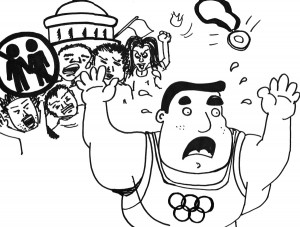Hosting Olympics in Brazil, Russia neglects safety
It’s time, once again, to break out that American flag sweatshirt and beer koozie to watch the world’s best athletes duke it out.
After spending upwards of $50 billion, the Russian government has made the 2014 Winter Olympic Games in Sochi the most expensive Olympics to date, topping China’s bill for the Summer Olympics in 2008 and obliterating Vancouver’s $9 billion price tag in 2010, according to Businessweek. Needless to say, this year’s games promise to be an international spectacle.
“Sochi could end up being one of the most-watched Winter Olympics in recent history,” said writer Richard Deitsch in Sports Illustrated.
The predicted spike in viewers, however, might be the result of something other than potential Olympic frontrunners Mikaela Shiffrin and Shaun White. The anti-homosexual stigma of Russian radicals has many fearful of repercussions against more liberal athletes, family members, coaches and those attending the games.
In fact, the controversial decisions to host the Games in Russia and Brazil have the world questioning the security of athletes and spectators alike. Along with reservations about the Russian Winter Olympics, critics feel uncertain about the current social unrest in Brazil, the host country for the 2014 World Cup and 2016 Summer Olympic Games.
So, why have the International Olympic Committee and the Fédération Internationale de Football Association elected to hold their sporting events in socially unstable venues? The answer lies in who ultimately benefits from these decisions.
The decision to hold the games in Russia and eventually Brazil don’t benefit the players or viewers. In fact, many LGBT-supportive athletes who would have gone to the 2014 Winter Olympics have since started a boycott. It was even announced that President Barack Obama and First Lady Michelle Obama would not be among the United States’ delegation to the opening ceremony. Instead, the U.S. delegation will include openly gay tennis star Billie Jean King, sending a strong message of opposition to Russia’s anti-gay sentiment.
The fanfare of the Olympic Games and the World Cup also disrupts the lives of many local Russian and Brazilian citizens. With thousands displaced by stadium construction in 12 of Brazil’s largest cities, riots have sprung up across the nation. Similarly, construction around Sochi has left several hundred displaced including those from a nearby mountain village called Akhshtyr that has been left without a sustainable water supply or public transportation for the past five years, according to The Nation.
The governments of host nations, however, reap many rewards. Politicians in favor of hosting the Olympics believe it produces long-term increases in tourism. Furthermore, the Olympic monuments and stadiums are left for the governments to profit from later, according to CBS News.
And the real win for the host countries is the chance to be the center of the world’s attention, and to leverage that exposure to benefit the countries’ images. For instance, the 2008 Summer Olympic Games in Beijing successfully advertised China as a global economic powerhouse. This could be the Brazilian government’s chance to boost its global standing.
This is not to say that reporters and networks want U.S. citizens to be placed in jeopardy, but they certainly would benefit the most from it happening. In fact, Russia’s homophobic laws existed long before the country’s bid for the Winter Olympics back in 2007, but networks only began reporting about it in the United States after the Olympic, five-ringed magnifying glass was lifted up to scrutinize the country for possible news stories.
NBC Sports has had broadcasting rights of the Olympic Games since 1988 and aims to provide an internationally neutral spectacle, but NBC News promises in depth coverage of anything that happens.
“NBC News will be there in full force with all of its journalists and all of its shows to cover news items. We’ve been doing this on an ongoing basis, whether it’s related to security, or as you’ve already seen, as it relates to the LGBT situation that is in Russia,” NBC Sports Group Chairman Mark Lazarus said in a statement.
No one can say that the major corporations that run these events are in cahoots with country leaders in a symbiotic moneymaking relationship. The decisions to hold these events in unstable places, however, benefit the games’ largest affiliates, while disregarding the safety of the players and fans.
Drew Klopfer is a sophomore majoring in critical studies and narrative studies.



One could make the claim that going to university at USC also neglects safety, and the decisions to study there benefit the university’s largest affiliates, while disregarding the safety of the students and the professors, given the university’s location.
Yet, I’m pretty happy that I went there, and as long as the choice to go or not to go is voluntary and not coerced, I don’t see the problem. It should be an enjoyable Olympics and it is good to see these events hosted in a wider range of countries.